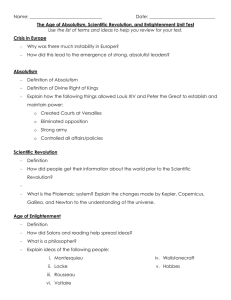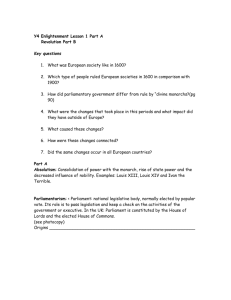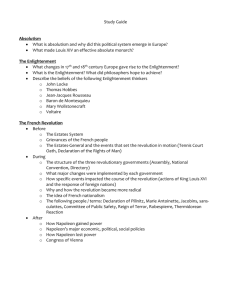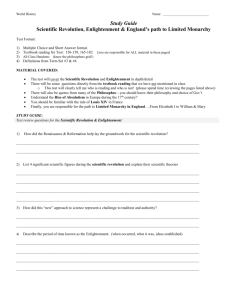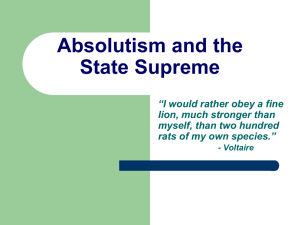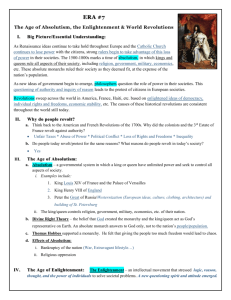Exploration, Absolutism, & Enlightenment!
advertisement
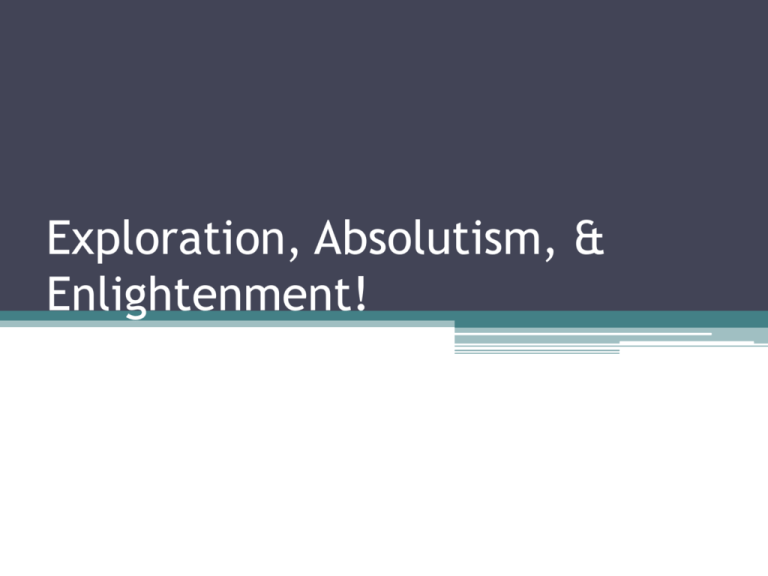
Exploration, Absolutism, & Enlightenment! Age of Exploration! Effects of the Renaissance • More ideas called into question • People want a greater understanding of their world • Ideas most commonly called into question: ▫ Religion – caused the Reformation ▫ Known world – caused the Age of Exploration ▫ Understanding the world – caused the Scientific Revolution Age of Exploration • Trade and curiosity spark exploration • Governments used to sponsor most voyages ▫ Government leaders desired land, resources, trade routes, etc. • Governments sponsoring exploratory voyages: ▫ ▫ ▫ ▫ ▫ Portuguese Spanish French English Dutch Signed the Treaty of Tordesillas (divided world in half to eliminate conflicts Main Explorations & Explorers • Bartolomeu Dias (1488) ▫ Reached Indian Ocean via African coast • Christopher Columbus (1492) ▫ Pretty well known • Vasco da Gama (1498) ▫ Sailed around Africa to India • Hernán Cortés (1519) ▫ Fought Aztecs in South America • Fransisco Pizarro (1522) ▫ Fought Incans in South America • Ferdinand Magellan (1522) ▫ Circumnavigated the world Results of Exploration • Positives ▫ Columbian Exchange Unique products traded between hemispheres ▫ Mercantilism Export more than you import ▫ Increase in capitalism People pooling money to form larger corporations (joint stock companies) ▫ New products ▫ New colonies • Negatives ▫ Slave trade Middle passage of Triangle Trade ▫ Imperialism ▫ Diseases to indigenous people Absolutism! Absolutism • Use your resources to define absolutism. • How can a government demonstrate absolutism? • What historical examples of absolutism are you aware of? Examples of Absolutism: France • Louis the XIV ▫ Became king at 23 after riots ▫ Weakened the power of the nobles/strengthened intendants (civil servants of France) ▫ Increased mercantilism, fur trade, factories = $$$$$ ▫ Palace at Versailles ($2 billion) 2000 rooms, 15,000 acres of gardens, 1400 fountains Extravagant meals Control of nobles ▫ “I am the State.” Palace at Versailles Examples of Absolutism: Spain • Phillip II ▫ Son of Charles V, takes control of Spain ▫ Gains Portugal in 1580 Gains control of areas in Africa, India, & West Indies ▫ Begins gaining incredible wealth through gold & silver Gold: 339,000 pounds ($5.97+ billion) Silver: 32,000,000 pounds ($8.40+ billion) ▫ El Escorial Examples of Absolutism: Hapsburgs • Family ruled Austria, Holy Roman Empire, & Spain • Fought Thirty Years War ▫ Catholics vs. Protestants primarily, but also over internal politics ▫ French Catholics join Swedish Lutherans against the Catholic Hapsburgs ▫ Peace of Westphalia: strengthened French monarchy by expanding lands German princes independent of HRE Weakened Hapsburgs in Spain & Austria Examples of Absolutism: Hapsburgs • Despite weakened state, power continued to grow • Austria ▫ Strong Catholic state ▫ United various German groups through negotiations and violence ▫ Maria Theresa First female ruler Persuaded Hungarians to support Austrians against Prussian control Examples of Absolutism: Hapsburgs • Prussia ▫ New Protestant power ▫ Peace of Westphalia allowed Prussian states to be organized under Hohenzollern family ▫ Took power away from nobles (Junkers) ▫ Military state under Frederick William I Junkers given military and government positions ▫ Frederick II Forced to watch friend’s beheading Sparked War of the Austrian Succession w/Maria Theresa Enlightenment! Enlightenment Ideas • Renaissance & Scientific Revolution expanded knowledge base in Europe & the way people looked at the world. • Human reason leads to the question of natural laws (laws that govern human nature) • Use of reason could solve problems or answer questions in every area Enlightenment Ideas • Social Contract: people give up natural rights for an organized society ▫ Thomas Hobbes People cannot be trusted Absolute monarchy ▫ John Locke People inherently good Government must be accepted by the people Enlightenment Ideas • Montesquieu ▫ Studied every government possible ▫ Separation of powers Limited monarchy of Britain protected against tyranny, but he misunderstood their organization Idea stuck though • Philosophes (“lovers of wisdom”) ▫ Use of reason could be used to change government, law, & society Philosophes • Voltaire • Rousseau ▫ Spoke out against corruption in government ▫ Wrote against inequality, injustice, slave trade, religious prejudice, etc. ▫ People good, but corrupted ▫ Minimal controls needed by elected government ▫ Good of community over good of the individual • Diderot ▫ Wrote articles to improve general knowledge & thinking ▫ Compiled in Encyclopedia ▫ Not accepted by French government or the Pope Enlightenment Ideas Spread! • Economics ▫ Rejection of mercantilism ▫ Laissez Faire “hands off” Little to no government interference in the economy ▫ Adam Smith The Wealth of Nations Market should regulate business Supply & demand drove economics • Enlightened despots ▫ Frederick the Great of Prussia ▫ Catherine the Great of Russia ▫ Joseph II of Austria • Revolutions ▫ American Revolution ▫ French Revolution ▫ Industrial Revolution Indirectly, but the result of changing the accepted ways of doing things
